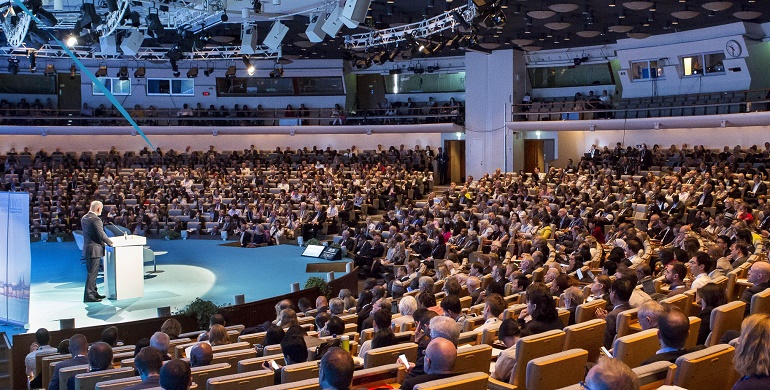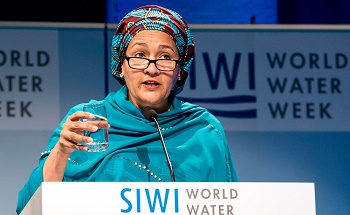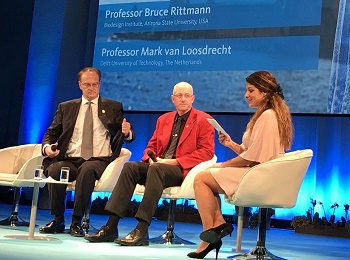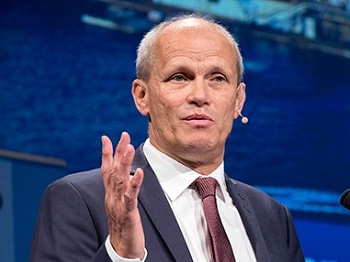SWWW 2018: ‘Forge strong partnerships to scale up action’
 ‘We need stronger partnerships involving civil society and the private sector, to scale up action’, said Deputy Secretary General Amina Mohammed of the United Nations at the opening of this year’s edition of the Stockholm World Water Week on 27 August.
‘We need stronger partnerships involving civil society and the private sector, to scale up action’, said Deputy Secretary General Amina Mohammed of the United Nations at the opening of this year’s edition of the Stockholm World Water Week on 27 August.
Mohammed urged to forge strong partnerships to share the risks of scaling up the massive action that is needed to achieve the Sustainable development goal on water by 2030. ‘There will always be pieces that come to the table why we cannot do things to bring action to scale’, she warned the global water community that had gathered in Stockholm.
 UN Deputy Secretary General Amina Mohammed called for strong partnerships to scale up actions that are needed to achieve the goals of SDG6 on water by 2030.
UN Deputy Secretary General Amina Mohammed called for strong partnerships to scale up actions that are needed to achieve the goals of SDG6 on water by 2030.
Deeper faith
Deputy Secretary General Mohammed was responsible for the architecture of all 17 SDGs and is now in charge of the implementation. ‘The enabling environment to come to scale will never be ready, unless we take a deeper faith together and try to achieve the outcome that we would like to see’, she said.
Mohammed asked the water community to come up with a creative solution. ‘Not just for pilots but to scale up’, she added. ‘The scale we need to reach everyone and to provide every household with drinking water and sanitation’.
Water prize winners
The opening plenary was also the scene of a talk with the two biotech pioneers, professors Bruce Rittmann (Arizona State University) and Mark van Loosdrecht (Delft University of Technology) who won this year’s Stockholm Water Prize for their work on the use of microbes to clean waste water efficiently.
 Stockholm Water Prize winners professors Bruce Rittmann (left) and Mark van Loosdrecht (middle) told how simple biological waste water treatment processes are and that they have the potential to make money.
Stockholm Water Prize winners professors Bruce Rittmann (left) and Mark van Loosdrecht (middle) told how simple biological waste water treatment processes are and that they have the potential to make money.
Both professors emphasized the potential of environmental technology and the use to microbes to turn pollution control into a business case. ‘It is seen as a cost but we want to turn it into a surplus by generating valuable resources. This is the future of our field’, said Rittmann.
Cost recovery of water treatment
Van Loosdrecht mentioned the availability of many different types of microbes that are already in the water to remove the pollutants. It is just a matter of engineering the treatment process. He predicted new waste water treatment installations to be built in the next thirty years that will make money. ‘These installations will be energy neutral and operated to produce resources with enough economic value to cover the operational costs of the treatment’.
As an example, Loosdrecht mentioned the production of polymers that can be mixed in loam, a mixture of sand, silt and clay, to produce bricks that can be dried in the sun. ‘The polymer from the waste water treatment process makes the brick not only stronger, but also more resistant to rain’.
 SIWI executive director Torgny Holmgren explained how effective nature-based solutions can be. They tend to bend, not break.
SIWI executive director Torgny Holmgren explained how effective nature-based solutions can be. They tend to bend, not break.
Solutions that bend
This year’s Stockholm World Water Week is all about ecosystems and nature-based solutions. In his opening remarks executive director Torgny Holmgren of the Stockholm International Water Institute (SIWI) that hosts the events, explained the importance of these type of solutions: ‘They are often cheaper compared to hard engineered solutions. They are also often multifunctional, improve the micro climate and the biodiversity, and they look good. They tend to bend, rather than break under pressure. They can restore their functionally and can adapt to changes.
Holmgren concluded that it is not a matter of green versus gray solutions. ‘We need both’, he said.
More information about the Netherlands Pavilion and the activities of the Dutch delegation can be found on this website.
Read more on this website
● Stockholm World Water Week 2018: A look back on an inspiring event to get SDG6 on track, 7 September 2018
● SWWW 2018: Blue deal seeks wisdom on water management from both sides, 6 September 2018
● SWWW 2018: Latest generation water-related apps for small farmers shown at African Spatial Delight, 4 September 2018
● SWWW 2018: Leave no one behind in WASH programmes demands a new mind-set, 3 September 2018
● SWWW 2018: Potential of blending finance remains untapped for water infrastructure in developing countries, 31 August 2018
● SWWW 2018: Water.org joins Finish Mondial to team up for affordable toilets worldwide, 31 August 2018
● SWWW 2018: Delft biotech pioneer Mark van Loosdrecht receives Stockholm Water Prize, 30 August 2018
● SWWW 2018: Open data on water availability can prevent that water scarcity leads to conflicts, 29 August 2018
● Meet the Dutch water delegation in the Netherlands pavilion at Stockholm World Water Week (booth 1 )
More information
Stockholm World Water Week
www.worldwaterweek.org
Netherlands Water Partnership
The Hague, the Netherlands
+31 70 304 3700
www.nwp.nl



